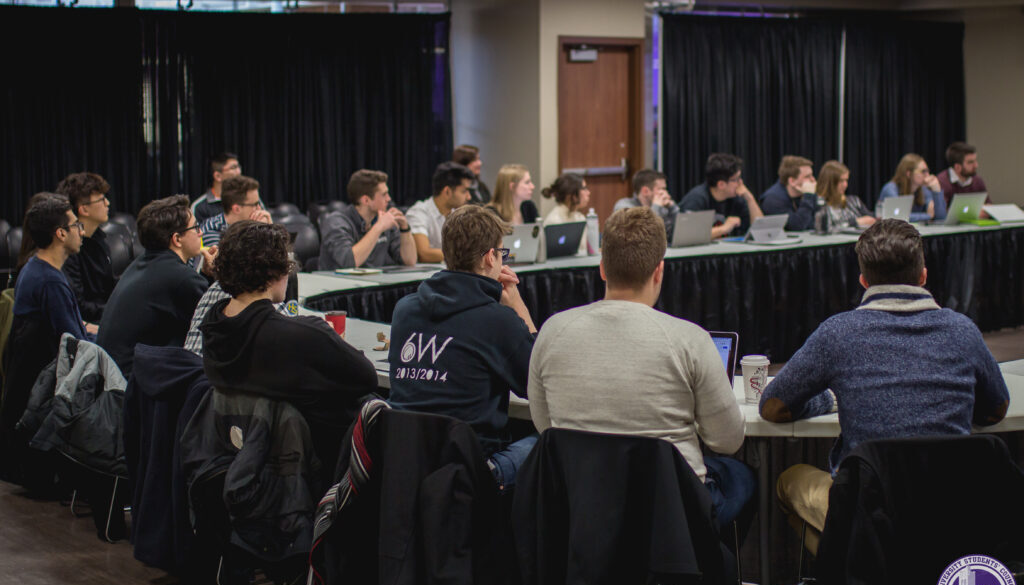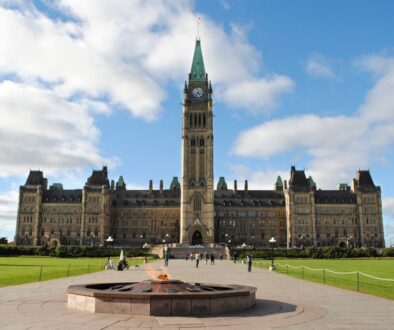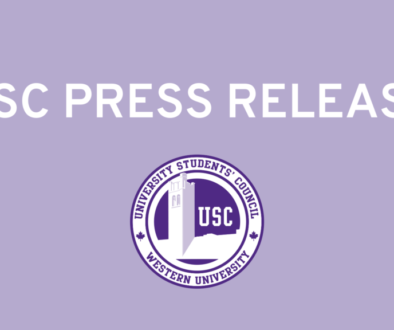November Council Recap: Councillors approve bylaw changes and executive restructuring
Last Wednesday, councillors from across fifteen faculties convened for the fifth meeting of the University Students’ Council for the 2019-20 academic year.
The meeting began with a presentation by Vice President Cat Dunne and Western University’s Associate Vice President Student Experience Jennie Massie, who shared recent changes that were made to the university’s Policy on Gender-Based and Sexual Violence.
The new policy reflects comprehensive feedback from Western students, staff, and community members, by way of surveys and focus groups, which has led to the development of a proactive, intersectional, and survivor-centric approach to sexual and gender-based violence. Most notably, the university has implemented a clearer procedure for disclosures and support options for survivors.
Many of the revisions were driven by Dunne’s advocacy through the Sexual Violence Policy Review Working Group throughout the summer. The new policy also centralizes and standardizes the procedures across all departments and offices on campus, including Western’s residences, which ensures students receive the same support regardless of who they disclose to on campus – a major change from past practices.
“Everyone should feel safe on their university campus,” noted Dunne. “These substantive changes to the policy aim to provide a more holistic approach to addressing gender-based violence, on and off campus, and shift the culture that presently exists at Western”.
Next, Secretary-Treasurer Declan Hodgins presented Terms of Reference for the Community Impact Fund, a one-time fund of $100,000, which will fund projects that aim to increase diversity and equity, address gender-based violence, and improve mental health support on campus. USC Councillors Femi Adewusi, Kyra Balogh, and David Carlson were ratified to serve on the committee, which will determine exactly how the money will be alloted.
“The three funding pillars are close to my heart. The prospect of being able to assist in the administration of a fund that I believe has the capacity to directly benefit students is thrilling. I can see proposals coming forward that would seek to improve community relations and benefit the student body as a whole,” said Carlson.
Council also ratified the appointment of representatives to the Sustainability Working Group, which helps set the strategic direction of the USC’s advocacy with regards to environmental sustainability and climate change. Students-at-large Lauren Goldrick and Dan Neiman, as well as USC Councillors Matthew Yee, Victoria Barroso, Matthew Chasmar, and Matt Reesor were all elected to the committee.
Following the meeting, Goldrick shared her excitement, stating, “I feel that Western is presently lacking in some aspects of sustainability and I would love to be part of the positive change that can be made. I am looking forward to setting impactful advocacy priorities and developing diverse programming to ensure a greener campus!”
Neiman also expressed his thoughts following his election. “I believe a committee like the Sustainability Working Group is vital to tackling climate change and solving environmental issues. Driving movement and change is difficult, but students are the ones who will be responsible for addressing this problem in the coming years. I look forward to working with students, the USC, and Western to take strides in tackling the single greatest challenge of our generation”.
Changes to Election Rules
Council passed two motions that overhaul the USC’s elections procedures in advance of upcoming student elections in the new year. Motions 2 and 3 amended Bylaw 2 and the Elections Governance Committee’s Finance, Governance, and Violations procedures.
The major change is the removal of the demerit points system, which has been replaced with two categories of violations: those not warranting disqualification and those warranting disqualification. Candidates who are found guilty of committing the former will be issued a warning or order to change behaviour by the Elections Governance Committee (EGC), while candidates found guilty of committing the latter will be disqualified.
Candidates who repeatedly commit offences not warranting disqualification may still be disqualified if they are found to be in contempt of the EGC.
“These changes were meant to simplify the elections procedures and close loopholes that have been exploited by candidates in past years,” noted Secretary-Treasurer Declan Hodgins, who spearheaded the changes to the bylaw and policies.
“We tried to create a system that was less rules-based and doesn’t peanilize candidates for making honest mistakes, but instead goes after people who intentionally undermine the integrity of our elections,” he added, “the new system operates under the assumption that students running in elections are trying to follow the rules.”
The new elections procedures will be in place for the upcoming student elections in February.
Executive Restructuring
Council unanimously passed two motions that approved the restructuring of the current five-student executive system by adding another executive exclusively responsible for advocacy. The move was pitched by the current executive team as a model to increase the organization’s advocacy capacity.
Related: Proposed executive restructuring aims to increase USC’s advocacy capacity
“The current executive structure limits the potential output and effectiveness of the USC because it creates a capacity issue,” explained President Bardia Jalayer, “we don’t have enough time or resources to execute on all of the advocacy our students are asking us to.”
Jalayer emphasized that the scope and potential of the USC has grown over the past five years and the executive team has to grow with that change.
“This proposal is a good sign for our organization. It means that we have the capacity and capability to grow because we see a key opportunity to provide significantly more value to students through advocacy.”
Other changes include the move of the student feedback function from the Communications Officer to full-time staff oversight and equity-based advocacy from the SPO to the Vice President University Affairs.
Next year’s executive will include the President and five level vice presidents: University Affairs, External Affairs, Student Support and Programming, Governance and Finance, and Communications and Public Affairs. The VPUA and VPEA will be elected by both incoming and outgoing USC Council at the 2020 AGM in March while the remaining VPs will be selected by a hiring committee in February.
Promotion of the election changes are expected to begin this week and continue into the new year. Students interested in learning more about executive roles are encouraged to consider applying for the USC’s executive shadowing program.
USC Council meetings are held the final Wednesday of every month, in the UCC Community Room at 7:00pm. Meetings are open to students, staff, and the community.




